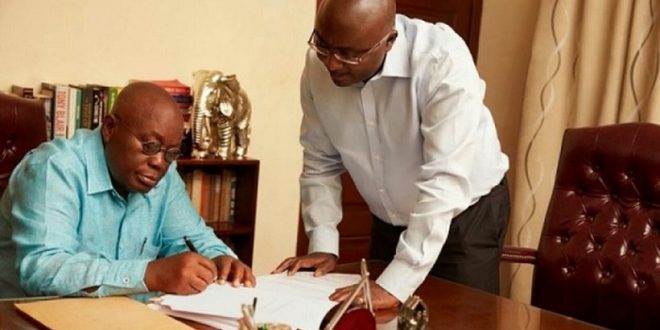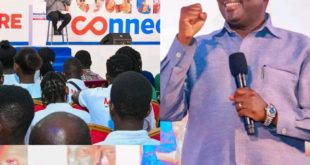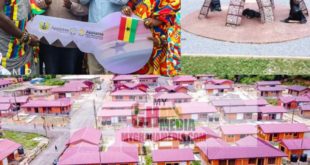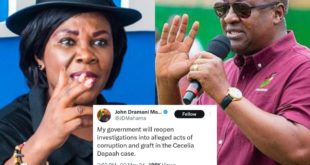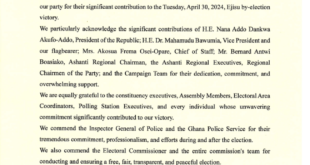Born in 1944 into a family dominated by careers in the law, politics and public service, President Nana Addo Dankwa Akufo-Addo was destined to become a lawyer, a public servant, a politician or all three.
Akufo-Addo is reported to have described from first-hand recollection the events during and immediately after the infamous riots of 28 February 1948 in Osu and Accra. It was his political baptism. He was only four years old then, but he remembers the tremendous movement of human beings and the ferocious displays of anger and resentment towards the colonial government of the day.
Consequently, the suspected leaders of the riots were arrested, with the exception of Nii Kwabena Bonnie III (the Osu Alata Mantse). Five prominent Accra lawyers and the general secretary of their political grouping, named Kwame Nkrumah, were arrested and detained. Led by J B Danquah, the group became famed as the Big Six, whose images adorn the national currency.
That was Akufo-Addo’s political baptism. Three of the Big Six were his direct relatives – Danquah was a grand-uncle, Will Ofori-Atta was his direct uncle and his father was Edward Akufo-Addo. He had sufficient acquaintance with the other three, especially Obetsebi-Lamptey, whose son Otanka (later known as Jake Obetsebi-Lamptey) was the same age and became Akufo-Addo’s first best friend and playmate.
Akufo-Addo then saw and must have been disturbed by the rancorous politics of the pre and post-independence era. By then, because he was raised in a political home, Nana Addo (as he was known) must have been bombarded daily with stories depicting the policy decadence of the latter Nkrumah years, and must have heard daily theses against the abuse of human rights and objections to the provisions of the 1960 constitution.
It was in these circumstances and with this upbringing that the young Akufo-Addo observed the imprisonment of his uncle J B Danquah under the Preventive Detention Act and the dismissal of his father as a Supreme Court judge by President Nkrumah for his ruling in the Tawiah Adamafio trial.
These two events awakened a taste for human rights activism in the young Nana Addo and it began to form an essential part of his political philosophy.
Activism first
Next came the overthrow of the Nkrumah regime and the restoration of parliamentary democracy. By this time Nana Addo was in university and had a more grounded ethic, having met many young ideologues on Legon campus, among them Professor Modibo Ocran (later nominated by Akufo-Addo for the role of Supreme Court justice during the tenure of President Kufuor), Professor Albert Fiadjoe, Tsastu Tsikata, Akilakpa Sawyer and other left-wingers of the day. The first ideological motif that seems to have taken root in him was the respect for human rights.
Nana Addo must have observed with great disappointment the furious and unhealthy attitudes manifested by the likes of Joe Appiah, who were determined to divide the United Party (UP) tradition for their own parochial interests. Try as they might, they could not convince Appiah, a staunch member of the tradition, to accept Kofi Abrefa Busia as its leader.
Appiah felt that he could lead, too, and in the end all the elders – including da Rocha and, most likely, Akufo-Addo’s father – gave up.
Appiah left to form his own party. Busia won a landslide. Appiah was vanquished and became a pariah to the UP.
Nana Addo must have felt terrible about this. His reaction to the rift began to evolve into a new and distinctive strand of political philosophy of UNITY of the group, UNITY of purpose and a broad-based approach to leadership.
Akufo-Addo’s next level of interaction with politics was to manifest the two strands of his nascent political philosophy: human rights and a broad-based political movement, but in keeping with the UP tradition.
This emerged through the key political event in the mid- to late 1970s: the protest by professional bodies against human rights violations of the Acheampong era and the attempt to torpedo democracy by introducing proposals for non-partisan politics through the concept of Union Government (UNIGOV).
Nana Addo was delivered to work alongside former Nkrumahists from the Convention People’s Party and the National Alliance of Liberals (NAL), together with people from his own political tradition. He enjoyed working with Obed Asamoah, Sam Okudzeto, Dr Agama, Afro Gbedemah, B J da Rocha, Victor Owusu, Peter Ala Adjetey, Adu Boahen and, of course, one of his long-time mentors, Akwasi Amankwa Afrifa, who got Nana Addo excited about this action to boost democracy.
Nana Addo tells a story about how, after court in Kumasi one day, he received a call to trek to Krobo in Mampong Ashanti to see General Afrifa.
As history will have it, on that day Akufo-Addo was in the company of another Akuffo, a young and dashing lawyer named Sophia. Of course, in later life, Akufo-Addo, in two of the twists and turns of history, would become president and appoint Sophia as chief justice.
There followed the creation of the People’s Movement for Freedom and Justice (PMFJ), which is what the Afrifa movement was called. Nana Addo became the joint general secretary of the group. The protest appeared to have been successful and democracy was restored.
Then came the bitter pill for Akufo-Addo: his uncle and his mentor were both fighting for the leadership of the party his uncle helped to found. He was devastated and could not even make a decision on how to vote. He felt the pain of division in politics.
So, by the end of the 1979 general election, Akufo-Addo’s political philosophy was well formed. It was twofold: an avowed pro-human rights ethic and a stickler’s insistence on party unity, plus a broad-based outlook for the party leadership.
Back to the Bar
At the beginning of the 1980s, Nana Addo supported the unity talks between the Popular Front Party (PFP) and the United National Convention (UNC). These talks gave birth to a new party called the All People’s Party (APP). The APP was to be led by Victor Owusu, with Alhaji Mahama Iddrisu as his running mate.
The APP was poised to win the 1983 elections … but these were not to be. Jerry John Rawlings and Kojo Tsikata showed up, and the rest is history.
************
In the early 1980s Akufo-Addo left the law firm founded by U V Campbell to set up his own. Together with his friend Dr Prempeh (now a chief in Asanteman), he formed Akufo-Addo, Prempeh & Co.
One of the distinguishing features of this law firm was that they represented clients for free on all human rights matters.
It was a big sacrifice to make and junior lawyers were not particularly excited by having to go to court for free but this was the master’s philosophy.
And, as providence would have it, many of the lawyers who emerged through this law firm became some of the best and brightest ever seen on the Ghana Bar.
Akufo-Addo, Prempeh & Co has produced as many as four attorney generals – the boss himself, Joe Ghartey, Gloria Akuffo and the current AG, Godfred Yeboah Dame.
The 1980s were quiet for politics in Ghana. Akufo-Addo spent this time living and working between England and Ghana.
Press freedom and the new NPP
At a grand funeral ceremony organised by the Ghana Bar Association for Nana Akufo-Addo’s father in 1980, the then president of the GBA, Mr William Adumoah Bossman (as he then was), paid glowing tribute to the late CJ but emphasised that if what had been seen of his son was anything to go by, then the Bar must be ready for a blistering legal career that should hopefully surpass that of the great Edward. To this, there was loud applause.
Bossman prophesied right.
***********
By 1991 Professor Albert Adu Boahen had used his university lectures to arouse the desire in Ghana for a return to constitutional rule and a return to a regime of human rights.
Under such pressure the militarist Provisional National Defence Council (PNDC) government agreed to allow party politics to return from 1992 under a new constitution.
The UP tradition had to re-form, and this time UNITY had to be key. Once unity was key and the choice was to be spread out, Akufo-Addo was in. This was his philosophy: let’s unite and broaden our base by making leadership accessible to all. So, he supported Adu Boahen.
Then came the loss of the 1992 election and the boycott of Parliament, which left the opposition with just the courts, street protests and the media to express their objection to J J Rawlings and his new National Democratic Congress (NDC).
At this time, Akufo-Addo introduced another strand of his philosophy: the clarion call for independent media and the repeal of the criminal libel law. He set up a newspaper and named it The Statesman – the same name as the one borne by J B Danquah’s paper in the 1940s.
So there emerged a third strand in the philosophy of Akufo-Addo: human rights, broad-based politics and independent media.
The years of opposition from 1993 to 1996 were very eventful. A new group called the Alliance for Change (AFC) emerged. It became a formidable group of young people who staged what is yet the biggest demonstration in Ghana ever: the Kume Preko march.
The success of the group and the calibre of their leaders made them a clear choice for political mobilisation and party politics.
This situation came with huge temptations. The NPP seemed to be struggling with youth mobilisation but was better than the CPP. It was felt that the AFC could usurp the political space of both parties to create a movement to supplant both traditions and win power for the moment.
This thought was very tempting and it became even more pronounced when the AFC’s choice of Kwame Pianim as the NPP’s candidate was undermined by a Supreme Court ruling disqualifying Pianim from running for president.
Elements in the AFC who really wanted the break away to form a new party included Charles Wereko-Brobby, Kojo Poku, Kakraba Cromwell and Kwesi Pratt Jnr, as well as, to some extent, Anthony Akoto Ampaw.
However, the most popular figure among the leadership of the AFC was the human rights lawyer Nana Akufo-Addo, who was also the group’s spokesman (as appointed by Nyaho Nyaho-Tamakloe), and his support was needed for the push to go it alone.
The NPP leadership contest proceeded without Kwame Pianim and elected John Kufuor for the first time to lead the NPP.
The groundswell of talk about the breakaway occasioned an alliance between the CPP (then known as the People’s Convention Party or PCP) and the NPP. Nana Addo was very much against the breakaway of the alliance, he stood for unity of the NPP.
So the 1996 election was fought, Kufuor lost and JJ was elected.
There were other elements in the AFC leadership, such as Kweku Baako, who felt the same as Akufo-Addo, and agreed that the alliance should not supplant the mainstream political parties. It is said that Baako had a great admiration for Professor Adu Boahen and seemed to have transferred this to Kufuor after Kufuor became the NPP candidate.
The youth began to put pressure on Akufo-Addo to challenge Kufuor for the NPP mandate for Election 2000 in 1998.
This writer is one of the young people who organised a bus from the University of Ghana to attend the NPP congress in Sunyani and offer Nana Addo support and raise his morale. So did many other Ghanaian youths from all walks of life.
We all met the candidate, and he addressed us in the company of General Joseph Nunoo-Mensah, who was his campaign manager at the time.
The candidate told us that, whatever happened, he was grateful for our support. He told us that, win or lose, we should support the winner to defeat the NDC in 2000 because, as he put it, “Ghana may collapse under a government of ineptitude if the NDC wins again”.
Kufuor won the contest and Akufo-Addo conceded defeat.
UNITY at all costs
In the weeks that followed, many were those who had encouraged Akufo-Addo to explore his popularity with the youth, create his own political movement and run against the NPP in Election 2000.
One other leader of the AFC, Charles Wereko-Brobby, who was much less popular and less fancied by the youth, succumbed to the temptation to form a new party. He left the NPP and founded the United Ghana Movement (UGM). This writer was at its launch in Nsawam in March 2000 as a reporter for Joy FM.
At that event Wereko-Brobby delivered an impressive message to the youth. Yet it was obvious that their loyalty that day lay elsewhere: with Nana Akufo-Addo, the avowed human rights lawyer and unifier.
Election 2000 and the Youth Factor
Kufuor’s campaign for Election 2000 took off without much ceremony. It launched and quickly took root in every nook and cranny of the hinterland.
Some time during the campaign, Nana Addo and his army of youths joined the Kufuor campaign to bring it a much-needed boost and impetus required to create a sensation for victory.
Victory was won and Kufuor became president. Akufo-Addo became attorney general and later minister of foreign affairs.
Enter a new face …
In December 2007 Akufo-Addo was elected the NPP’s flagbearer.
His first choice of running mate was Hajia Alima Mahama. Akufo-Addo felt it was time to spread the base to include gender parity. Somehow, members of his party felt it was not the time for women.
The choice of running mate being exclusively his, Akufo-Addo could have insisted and proceeded to appoint Hajia Alima but, holding to the philosophy of unity and reconciliation, he agreed to change the candidate and named a youthful banker, Mahamudu Bawumia, whose father was a founder of the Northern People’s Party, which became the party with the highest number of parliamentary seats in the UP alliance led by Busia.
Bawumia the Elder, the father of Mahamudu Bawumia, had continued in politics with the PNDC and NDC and had risen to become chairman of Rawlings’s Council of State.
The announcement of the new choice of running mate prompted questions, but Nana Addo campaigned among important people in the party to secure their support and backing for his choice.
Election 2008 was lost. And in 2012 Nana Addo returned with the same running mate – Bawumia.
By the end of the 2013 election petition, Bawumia had won the hearts of most NPP youth. He had come of political age and was now a huge asset to the party. Akufo-Addo’s philosophy was beginning to take root in the NPP.
The NPP gained significant traction in the Mahama years from 2013 towards 2016. So many high-profile young corporate leaders began to associate with the NPP.
Important members of corporate Ghana and high-profile journalists such as George Andah and Kojo Oppong Nkrumah joined the NPP and became parliamentary candidates. Young musicians and comedians rallied behind the NPP, pulled by the Akufo-Addo philosophy.
By the year 2016, the NPP was fully Akufo-Addo’s party and it was at its attractive best.
Not even the major upheaval in the form of the boardroom crisis that led to the removal of the chairman and general secretary could undermine the resolve of this youthful army of Akufo-Addo faithful. They proceeded to win a record-breaking landslide victory against John Mahama.
As soon as power came, Akufo-Addo began to pursue UNITY. He remembered his opponents from 2007 and proceeded to name Alan Kyerematen as trade minister, long before any minister was officially named. The Alan caucus was happy and liked the respect that Akufo-Addo was showing their candidate. The decision was all about making sure that the crew remained united.
From the first term, Dr Bawumia had shown that he would be a great vice-president, full of innovation and thoughtful leadership. He managed to win the hearts of most of the youth.
Mahamudu Bawumia and Nana Addo Dankwa Akufo-Addo
In 2020 Akufo-Addo was elected for a second term but the NPP took a hit in Parliament.
Bawumia and the oomph factor
Today, worsening global economic conditions have forced the government into a programme with the International Monetary Fund and all this has made Election 2024 a difficult prospect for the NPP.
So, in choosing its new flagbearer, the army of the party’s youth is guided by the strands of Akufo-Addo’s philosophy – which, among other things, is also the broad-based philosophy of the NPP.
If the NPP achieves victory in 2024 Akufo-Addo’s philosophy will have been secured 100%.
For the NPP youth, this is their fight, and they are desperate to show a new direction of party leadership for the NPP.
This is what is giving Bawumia the lead, the oomph, and creating the enthusiasm around his campaign. The political astuteness of his wife, Hajia Samira, also makes Bawumia’s candidature very attractive.
The real big fight will begin next week when Bawumia will settle in lane one to run against the former president John Dramani Mahama in lane two.
Until then, let’s watch the political space.
Paul Adom Otchere is a political journalist and the presenter of the current affairs magazine programme “Good Evening Ghana” on Metro TV
THANK YOU for constantly reading stories on MyGhanaMedia.com, a news publishing website from Ghana. Kindly like, follow, comment, and SHARE stories on all social media platforms for more entertaining updates!
Follow us on Twitter: https://twitter.com/
Source: MyGhanaMedia.com
There are four types of content published on MyGhanaMedia.com daily: curated content; syndicated content; user-generated content; and original content.
 MYGHANAMEDIA.COM Best Source Of Latest News
MYGHANAMEDIA.COM Best Source Of Latest News
